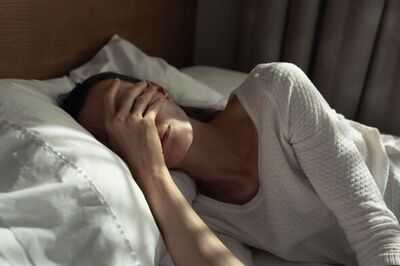One of the UK's leading sleep experts has suggested that smartphones should be banned from the bedroom and replaced with paperbacks, alarm clocks and analogue wind-down routines, reminiscent of the 1990s. Lisa Artis, Deputy CEO of The Sleep Charity, has issued a warning that "Britain's bedtime burnout has reached crisis point", particularly among Gen Z and young adults.
A recent study, commissioned by sleep-tech firm Simba, discloses that nearly half (48%) of adults and 54% of people aged between 25 to 34 spend the final hour before lights out swiping or streaming.

On average, Britons accumulate 68 minutes of screen time after work and according to the study, Gen Z and Millennials aged 25-34 were the most likely to report that evening screen use disrupts their sleep, with 17% waking up feeling more anxious than when they went to bed.
The poll of 2,000 UK adults reveals that one in 10 adults (11%) and 15% of 25 to 35 year olds feel trapped in a cycle of overstimulation and sleep-deprivation. NHS guidance recommends adults get at least seven hours of quality sleep each night - yet the data shows 61% of Brits are falling short.
Lisa shares: "We're dealing with a generation who don't know what it means to truly switch off. Bedrooms have become extensions of our phones - notification-heavy, dopamine-loaded and full of pressure. The simple act of winding down has disappeared."
One in five adults and a quarter of millennials admit that late-night scrolling leaves them feeling "wired" rather than relaxed, and nearly half (47%) feel they'd sleep better if they had a screen-free bedroom. These trends are fuelling what Lisa refers to as a "culture of bedtime burnout and overwhelm" - where rest has become another task on the to-do list, rather than a state of being.
Lisa observes: "We are overstimulated, overtired, and overconnected. Our brains are not designed to transition from TikTok to deep sleep in 60 seconds. We need space to come down from the day. But instead we're feeding our nervous systems constant content and calling it downtime."
Among those who've cut screens, 14% noticed improved sleep within weeks, and 11% experienced a boost in mood and energy. Lisa shares: "There's a sleep perfectionism that didn't exist in the 90s. Now it's all about data and discipline - but what most people need is to feel safe, warm, relaxed and disconnected from the world for a few hours."
The solution? Reintroducing analogue bedtime routines from the 90s where individuals ditch screens and are less wired.
Steve Reid, CEO of Simba, says: "We wouldn't let our children drink coffee before bed, but we hand them devices that are neurologically designed to keep them alert. That has to change. Tech in the bedroom has become so normalised that we don't even question it. But it's quietly eroding our sleep, our calm, and in many cases our mental health. We're nostalgic for the mental quiet of that era - for a time when no one expected you to be available at midnight, and nothing could 'ping' you out of sleep."
Prior to smartphones, bedrooms weren't cluttered with gadgets demanding attention. During the 90s, technology remained in the living room or office. Recreate that separation
Use a proper alarm clock - not your iPhoneThat basic plastic clock-radio from Argos? It served its purpose. No notifications. No glowing display at 2am.
Enjoy a book before sleep - 90s fashionBefore TikTok and streaming lists, bedtime meant a chapter or two of something captivating. Rediscover the most beloved 90s bestsellers like High Fidelity by Nick Hornby (1995), The Alchemist by Paulo Coelho (1993 UK release), Girl, Interrupted by Susanna Kaysen (1993), The Secret History by Donna Tartt (1992), The Beach by Alex Garland (1996) or The God of Small Things by Arundhati Roy (1997).
Limit yourself to four channels only - no binge-watchingIn the '90s, if you missed The X-Files, you simply missed it. There was no catch-up, no streaming, no "just one more episode." Reintroduce those boundaries. Limit yourself to the original five such as: BBC One, BBC Two, ITV, Channel 4 and Channel 5. No autoplay. No bingeing. Just one show - then lights out. Restricting your options helps cut bedtime decision fatigue.
Go to bed when you're tired - not when your feed runs outIn the 90s, doomscrolling wasn't a part of the daily lexicon. Analogue wind-downs cue your brain to rest, not react. If your body said it was bedtime, you went. Relearn your own rhythms. If you're yawning, you're done. Go to bed.
You may also like

'No one will be spared': Maharashtra CM on Satara woman Doctor's suicide case

Pocso case: K'taka HC reserves verdict on quash petition by ex-CM

Agartala Municipal Corporation organises 'Sharad Samman 2025' in presence of Tripura CM

Every word Enzo Maresca said on Chelsea loss, Stamford Bridge issue and Joao Pedro form

Lamchemnba, Udham Singh, Anant Deshmukh, Ahaana, and Dhruv extend India's winning streak at Asian Youth Games






